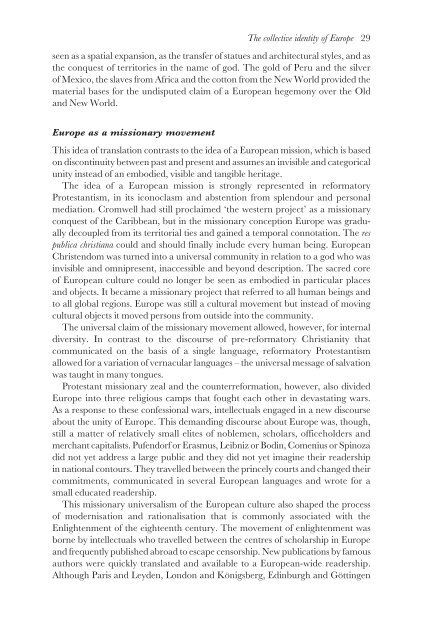Europeanisation, National Identities and Migration ... - europeanization
Europeanisation, National Identities and Migration ... - europeanization
Europeanisation, National Identities and Migration ... - europeanization
You also want an ePaper? Increase the reach of your titles
YUMPU automatically turns print PDFs into web optimized ePapers that Google loves.
The collective identity of Europe 29<br />
seen as a spatial expansion, as the transfer of statues <strong>and</strong> architectural styles, <strong>and</strong> as<br />
the conquest of territories in the name of god. The gold of Peru <strong>and</strong> the silver<br />
of Mexico, the slaves from Africa <strong>and</strong> the cotton from the New World provided the<br />
material bases for the undisputed claim of a European hegemony over the Old<br />
<strong>and</strong> New World.<br />
Europe as a missionary movement<br />
This idea of translation contrasts to the idea of a European mission, which is based<br />
on discontinuity between past <strong>and</strong> present <strong>and</strong> assumes an invisible <strong>and</strong> categorical<br />
unity instead of an embodied, visible <strong>and</strong> tangible heritage.<br />
The idea of a European mission is strongly represented in reformatory<br />
Protestantism, in its iconoclasm <strong>and</strong> abstention from splendour <strong>and</strong> personal<br />
mediation. Cromwell had still proclaimed ‘the western project’ as a missionary<br />
conquest of the Caribbean, but in the missionary conception Europe was gradually<br />
decoupled from its territorial ties <strong>and</strong> gained a temporal connotation. The res<br />
publica christiana could <strong>and</strong> should finally include every human being. European<br />
Christendom was turned into a universal community in relation to a god who was<br />
invisible <strong>and</strong> omnipresent, inaccessible <strong>and</strong> beyond description. The sacred core<br />
of European culture could no longer be seen as embodied in particular places<br />
<strong>and</strong> objects. It became a missionary project that referred to all human beings <strong>and</strong><br />
to all global regions. Europe was still a cultural movement but instead of moving<br />
cultural objects it moved persons from outside into the community.<br />
The universal claim of the missionary movement allowed, however, for internal<br />
diversity. In contrast to the discourse of pre-reformatory Christianity that<br />
communicated on the basis of a single language, reformatory Protestantism<br />
allowed for a variation of vernacular languages – the universal message of salvation<br />
was taught in many tongues.<br />
Protestant missionary zeal <strong>and</strong> the counterreformation, however, also divided<br />
Europe into three religious camps that fought each other in devastating wars.<br />
As a response to these confessional wars, intellectuals engaged in a new discourse<br />
about the unity of Europe. This dem<strong>and</strong>ing discourse about Europe was, though,<br />
still a matter of relatively small elites of noblemen, scholars, officeholders <strong>and</strong><br />
merchant capitalists. Pufendorf or Erasmus, Leibniz or Bodin, Comenius or Spinoza<br />
did not yet address a large public <strong>and</strong> they did not yet imagine their readership<br />
in national contours. They travelled between the princely courts <strong>and</strong> changed their<br />
commitments, communicated in several European languages <strong>and</strong> wrote for a<br />
small educated readership.<br />
This missionary universalism of the European culture also shaped the process<br />
of modernisation <strong>and</strong> rationalisation that is commonly associated with the<br />
Enlightenment of the eighteenth century. The movement of enlightenment was<br />
borne by intellectuals who travelled between the centres of scholarship in Europe<br />
<strong>and</strong> frequently published abroad to escape censorship. New publications by famous<br />
authors were quickly translated <strong>and</strong> available to a European-wide readership.<br />
Although Paris <strong>and</strong> Leyden, London <strong>and</strong> Königsberg, Edinburgh <strong>and</strong> Göttingen



